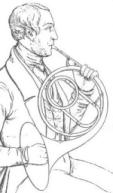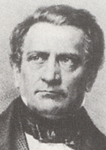True Romantics |
|
| (1784–1851) |
Allegro
Andante
Minuetto – Trio
Finale: Allegro
|
| (1792–1868) |
Allegro
Andante
Menuetto Allegro - Trio
Finale Allegro
|
| (1803–1890) |
Andante - Allegro assai
Scherzo - Trio
Andante
Allegro vivace
|
 |
Martin Joseph Mengal was born in Ghent in 1784. He came from a family
of horn players - his father taught him the instrument and his younger
brother also had a very successful career as a horn player in Ghent.
However, Ghent was not a nice place at the beginning of the nineteeth century. It was known as "the Manchester of the continent". a mass of squalid industrial slums jammed with the homeless and unemployed. Poverty was endemic. Typhoid and cholera epidemics were common. Mengal moved to Paris where he played with the Opera Comique and studied compostion with Anton Reicha, the man who famously introduced the concept of the wind quintet to Paris society and established performances of his newest quintet as unmissable social events. In 1825 Mengal returned to Ghent as director of the theatre, but moved to The Netherlands soon afterwards. He returned permanently to his home town in 1835 to become the first director of the consevatorium. He died in 1851 Mengal wrote a large number of operas and a considerable quantity of chamber music. His wind quintets are quite unlike those of his contemporaris - the textures are much fuller and seem to have more in common with string quartets of the time than with the wind quintets of Reicha and Danzi. All his wind quintets are based on the works of other composers. The quintets we are proposing to perform were originally violin sonatas by Mozart, Haydn and Beethoven. They have been reworked by a highly skilled composer and derserve to be heard again. (Our picture is not actually of Mengal: we have not been able to find a portrait of this neglected master.) |
This work in based on Beethoven's Op. 12 violin and piano sonatas |
|
 |
Franz Paul Lachner (1803-1890) was born in Rain am Lech (Bavaria) and died in Munich where he went after the death of his first teacher, his father, in 1822. There he worked as a teacher, organist, cellist, violinist, horn player, double bass player and composer.
In 1823 he moved to Vienna where he became friendly with Beethoven and Schubert. He moved back to Munich in 1834, as conductor of the opera, and retired in 1868 (under pressure from Wagner who considered him to be too old-fashioned for the job). As a composer his greatest influences were Mozart and Beethoven, but he was also inspired by his great firend Schubert, and by Mendelssohn and Spohr. His compositions include many songs, four operas, 8 symphonies, and a wealth of chamber music. |
This quintet is an early work, dating from 1823, and reflects his first influences. It is light-hearted, classical and charming, and was probably written for the Vienna Harmonie Quintett, formed in 1821 to perform the works of Reicha. |